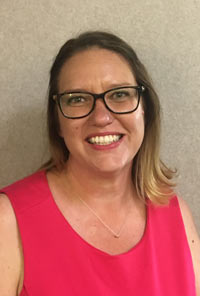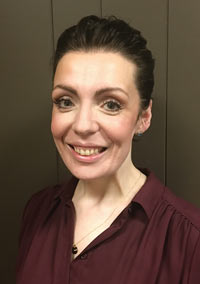Spotlight on Cancer Registrars: Amy Baldwin-Stephens and Sara Mercado
Posted on
They say that knowledge is power — it equips us to predict, understand, prevent, and solve problems. Sourcing healthcare knowledge is critically important, especially when it comes to cancer, where it must be broad in scope, precise in detail, and backed by meticulous data. In Waterbury, that data is managed by highly trained cancer registrars working at the city’s two hospitals: Amy Baldwin-Stephens at Saint Mary’s Hospital and Sara Mercado at Waterbury Hospital.
Cancer registries are vast databases of detailed information about individual cancer cases. Cancer registrars, like Sara and Amy, create and manage those databases by collecting, recording, tracking, analyzing, and reporting data for every cancer patient seen at their respective hospitals. Registry data includes patient demographics, cancer characteristics, treatment information, and patient outcomes. It is gleaned from a variety of sources, including pathology reports and hospital discharge data.
“Once a case is identified as being reportable, we create an ‘abstract’ summarizing the patient’s diagnosis and care,” explains Sara. “I always think of it as telling the patient’s cancer story: How/when/where were they diagnosed? What kind of cancer is it, and where is it? How severe/advanced is it? Where/ how were they treated? Did the cancer go away? Did it come back five years later? As the world has begun to better understand cancer’s behavior, the level of information we collect has increased exponentially.”

at Saint Mary’s Hospital

at Waterbury Hospital
Amy and Sara share those patient stories with healthcare agencies locally, across the state, and across the nation.
“The data we collect is reported to the State of Connecticut Central Tumor Registry and to the National Cancer Database, which is overseen by the American College of Surgeons’ Commission on Cancer,” Amy explains. “The Connecticut Central Tumor Registry reports data nationally to the National Cancer Institute’s Surveillance Epidemiology and End Results (SEER) program. We also participate in a stringent accreditation process through the American College of Surgeons’ Commission on Cancer. Accredited programs must have a cancer committee to oversee cancer program activities, and the cancer registrar is an integral part of the cancer committee, providing data for decision-making purposes and to ensure quality data are collected for each patient.” It is that breadth of accountability that Sara, who has worked in the field for four years, finds so rewarding.
“On any given day, I might be summarizing a patient’s diagnosis and treatment to report to the State of Connecticut, organizing a Cancer Committee meeting, attending an educational seminar on the newest advancements in cancer technologies, or researching the latest changes in cancer staging,” Sara says, “and that’s just a small handful of the responsibilities of the job.”
Both Amy and Sara hold Registered Health Information Technician (RHIT) and Certified Tumor Registrar (CTR) credentials, which ensure that they are technologically prepared to effectively manage medical databases and understand cancer terminology and treatment protocols. Their preparation required them to study everything from anatomy, physiology and database management, to medical coding and healthcare history and law. The work they do is challenging; the potential impact is almost immeasurable.
“In a behind-the-scenes way, cancer registries have been helping prevent and treat cancer for decades,” explains Sara. “Whenever a person reads about a cancer statistic in the United States, the data behind that statistic came from a cancer registrar. Physicians need data for decision making, researchers need data to determine cancer trends, hospitals need data to assess the needs of the communities they service, and the companies developing new cancer treatments need data to find out what works and what doesn’t. Advancements in cancer care simply cannot be made without the data that cancer registrars provide.”
